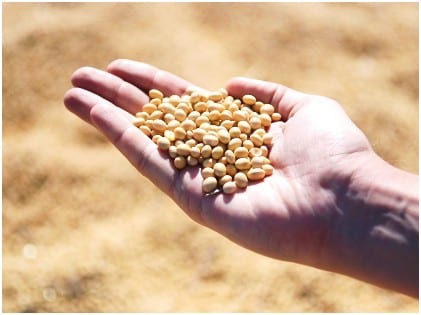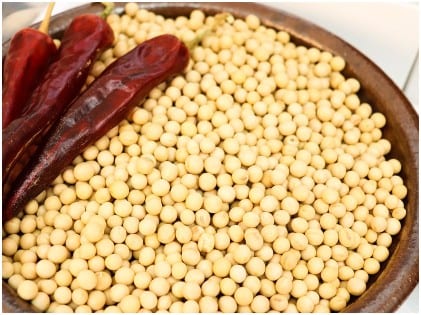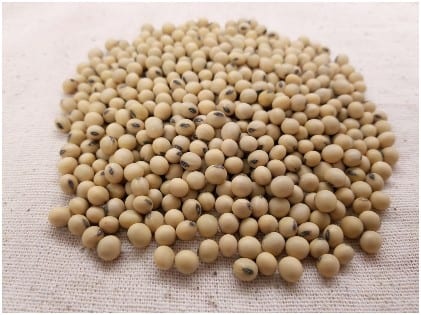Dieticians have been debating about the health benefits of soy products for quite some time now. It seems that the food manufacturing industry is keen on filling the racks of the food mart with products that contain soybean extract. Many hold the notion that soy in all forms is not quite good for health, while others think that the protein obtained from the soybean acts as an amazing supplement for the vegetarian population. Here’s taking a look at what kind of health benefits you can derive from soybean extracts and soybean in general.
Soy Bean Has Been A Staple For Quite Some Time Now
 Large-scale cultivation of soybean only started in the USA during the beginning of the 1800s. The bean was first discovered in the eastern parts of Asia. The climatic and the soil conditions in this part of the world were perfect for the cultivation of the bean. During the time of the Civil War in the US, soybean extract was also used for making coffee because of its similar taste.
Large-scale cultivation of soybean only started in the USA during the beginning of the 1800s. The bean was first discovered in the eastern parts of Asia. The climatic and the soil conditions in this part of the world were perfect for the cultivation of the bean. During the time of the Civil War in the US, soybean extract was also used for making coffee because of its similar taste.
The scientists of that time were certain that the bean was much more than met the eye. It was the reason why many of them started their research to find out the benefits of the particular bean. One scientist, in particular, was named George Washington Carver. He spent a great deal of time discovering the hidden health benefits of soybean extract. He wanted to find out about the lesser-known and unknown benefits of the bean.
Once it was brought out in the open that these little beans of various shapes and colors are storehouses of protein, the cultivation of the crop in the Midwest and the southern parts of the country received a new impetus. It is how the Asian crop managed to scale the gap of an entire ocean and gradually became a staple in the USA.
Health Benefits Of Soy Bean Extracts
 A lot has been said and done about the extract of soybeans. Apart from being a major source of protein and dietary fiber for the vegetarian population, there are many medicinal benefits of the beans and their extract. Scientists have found out that if the beans are consumed in a balanced quantity, they can work wonders. Apart from consumption by humans, soybeans are also considered a staple for domestic cattle as these beans help make them healthy and fat.
A lot has been said and done about the extract of soybeans. Apart from being a major source of protein and dietary fiber for the vegetarian population, there are many medicinal benefits of the beans and their extract. Scientists have found out that if the beans are consumed in a balanced quantity, they can work wonders. Apart from consumption by humans, soybeans are also considered a staple for domestic cattle as these beans help make them healthy and fat.
Prevents The Risk Of Breast Cancer
The scientists, who have been conducting researches on soybean extract in recent times, have made a massive medical discovery. According to the latest reports, the extract brings down the possibilities of breast cancer in women. Some claimed that women in Asia have the habit of consuming soybean in all forms since childhood days. Exposure to soy at a young age helps their body in resisting breast cancer. They added that the percentage of women in Asia suffering from breast cancer is far less when compared to the other parts of the world.
Prevents Diabetes
 Scientists have also found out that all soy products and soybean extracts have the amazing power of nullifying the ill effects of high sugar levels in the bloodstream of the patients. The extracts do not increase the sugar level in the blood of the patients. People consuming soybeans have been found more resistant to the adverse effects of increasing blood sugar.
Scientists have also found out that all soy products and soybean extracts have the amazing power of nullifying the ill effects of high sugar levels in the bloodstream of the patients. The extracts do not increase the sugar level in the blood of the patients. People consuming soybeans have been found more resistant to the adverse effects of increasing blood sugar.
Prevents Kidney Diseases
Most people have chances of suffering from kidney stones. As the kidney is associated with the processing of protein, people suffering from any kidney disease are instructed to stay away from the protein-rich diet. But it has been found that all such people can increase their protein intake while maintaining optimum kidney health by consuming soy extract. The protein in the extract can be digested by the body, and it will have no harsh effects on the patient.
These are a few of the numerous advantages of eating soy extracts. The soybean is a magical crop that has many amazing benefits. However, you should always talk to your doctor before including it in your diet plan. This is because soybean can be eaten in many ways, and which form would be best for you can only be determined by a licensed nutritionist.
